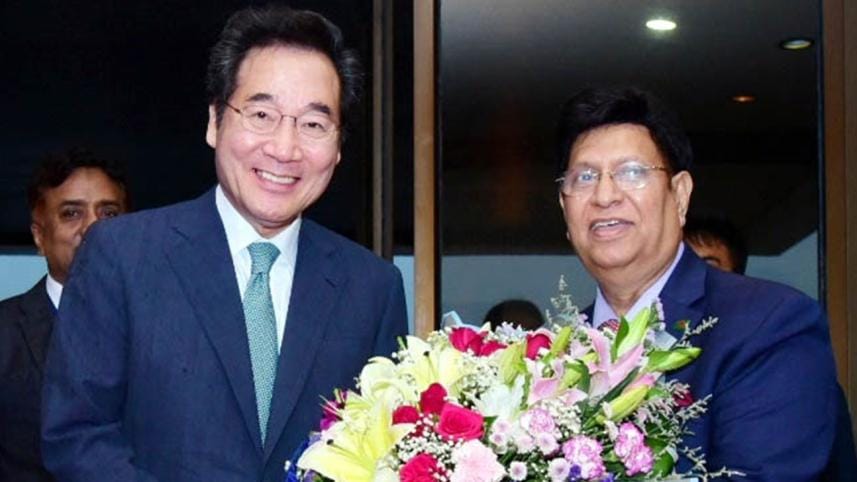Deepening Dhaka-Seoul ties

South Korean Prime Minister Lee Nak-yeon is visiting Bangladesh as part of a two-day official trip and it is expected that the outcome of the visit will be a milestone in deepening Bangladesh-South Korea relations. But how can Dhaka-Seoul ties be deepened?
It's a truism that South Korea matters to Bangladesh considering its socio-economic contributions in the country. South Korea was the largest investor in our ready-made garments (RMG) sector amounting to USD 103.05 million in 2017 (Financial Express, May 2, 2018). Additionally, if one looks at the volume of remittance that Bangladesh received in the fiscal years 2017 and 2018, South Korea contributed more than Japan. For instance, Bangladesh received USD 22.89 million in FY 2017 and USD 31.44 million in FY 2018 from Japan. On the contrary, Bangladesh received USD 64.71 million in FY 2017 and USD 96.27 million in FY 2018 as remittance from South Korea. South Korea also takes in a good number of Bangladeshi workers. This implies the importance of South Korea as a development partner of Bangladesh.
South Korea and Bangladesh should focus on how they can broaden and strengthen their relationship for mutual benefits through exploring new avenues. Below are some possible areas of cooperation:
Deepening economic and trade relations
At the second Bangladesh-South Korea Foreign Office in November 2014, Bangladesh and Korea acknowledged that there is a huge untapped potential that needs to be harnessed to upgrade their bilateral trade relations (UNB, November 6, 2014). In that consultation, the Korean delegation demonstrated a positive intent to import pharmaceutical products, ceramics, more jute and jute-made products from Bangladesh (Ibid).
It is believed that Bangladesh has a huge untapped export potential that South Korea can exploit but one of the major challenges in that regard—i.e. strict origin of market in the South Korean market—needs to be addressed first. Besides, Kabir (June 23, 2013) contended that the long-term untapped export potential is as high as 46 percent. It means that Bangladesh can increase export to South Korea significantly by removing constraints such as infrastructural and institutional barriers. In this context, to promote economic and trade relations between Bangladesh and South Korea, a Comprehensive Economic Partnership Agreement (CEPA) can be taken into consideration.
Accelerating South Korean investment in Bangladesh
Bangladesh is a lucrative destination for foreign investments. The country has several investment-friendly policies including equal treatment for local and foreign investors, legal protection against nationalisation and expropriation, 100 percent ownership, tax and duty exemptions and guarantees for repatriation of capital and dividend. According to a study by Japan External Trade Organization (JETRO), Bangladesh is one of the most competitive locations among the ASEAN, Far Eastern, and South Asian countries. In addition, a World Bank study on investment environment entitled "Investing Across Borders (IAB) 2010" identifies Bangladesh as one of the convenient destinations for FDI for its investment-friendly facilities.
Considering the comparative advantages that Bangladesh offers and comparing the increased level of South Korean trade, its investment has not increased at the same pace. Hence, there is a need for increasing South Korean investment in Bangladesh which can create a win-win situation for both parties. In this case, the Bangladesh embassy in Korea needs to play a substantial role to attract Korean investors.
Increasing workforce exports to South Korea
Along with other East and South East Asian countries, there is a shrinking workforce in South Korea due to its aging population. On the other hand, there is an increasing demand for labour in the booming Korean industries. Goldman Sachs forecasts that Korea will not be able to catch up with the needs for productivity and hence its economy will fall. This fall is only because of the decreasing Korean population. According to Korea statistics, its population is projected to decrease by 6.41 million. On the contrary, "about three million people are coming into the workforce every year while 2 million out of these are being employed. About 67 percent of our [Bangladesh's] population is aged below 25 years." (Khaled, January 27, 2015) In addition, South Korea has emerged as an example for setting up a unique model of recruiting foreign workers via state mechanisms that ensure low-cost migration and better benefits and protection of migrant rights. Hence, South Korea has emerged as an important potential destination for Bangladeshi workers.
Strengthening cooperation in science and technology
Though Bangladesh and South Korea concluded the Agreement on Scientific and Technological Cooperation on May 26, 1995, progress so far has not been satisfactory. In fact, in this age of science and technology, there is no alternative to technology sharing. And the reputation of South Korean science and technology is widely recognised. So cooperation is imperative to galvanise the bilateral relations on this front. In addition, it is also recognised that Bangladesh is one of the countries most vulnerable to the impacts of global warming and climate change. In that case, South Korea's expertise in science and technology, especially in green technology, will be greatly helpful for Bangladesh.
Promoting people-to-people contact
Significant strides have been made in promoting people-to-people contact between Bangladesh and South Korea since the beginning of their formal relations. Notably, a "Cultural Exchange Agreement" between the two countries was signed at Dhaka on 14 June 1979. Such initiatives are imperative to improve people-to-people contacts. Bangladeshi students taking higher education in South Korean institutions certainly play an important role in this regard. But their number is not high enough. Korea can increase the volume and scope of scholarship to the students and teachers of Bangladesh to study at Korean institutions.
In addition, Bangladesh's well-known tourist destinations and historical monuments need to be properly utilised to attract Korean tourists which will also bolster people-to-people connection.
Mainstreaming South Korea in Bangladesh Foreign Policy
Considering the importance of South Korea in the socio-economic development of the country, Bangladesh needs to mainstream South Korea in its foreign policy priorities. In theory, South Korea matters to Bangladesh in many ways, but the country is not studied with great importance in the foreign policy discourse of Bangladesh. Thus, the syllabus on Bangladesh foreign policy needs to be redesigned incorporating South Korea in it.
Md Shariful Islam is an assistant professor in International Relations at the University of Rajshahi.
Email: shariful_ruir@ru.ac.bd




 For all latest news, follow The Daily Star's Google News channel.
For all latest news, follow The Daily Star's Google News channel.
Comments